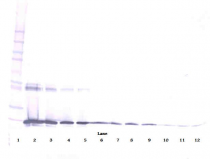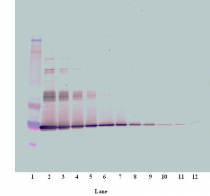ARG56627
anti-IL6 antibody
anti-IL6 antibody for ELISA,IHC-Formalin-fixed paraffin-embedded sections,Neutralizing,Western blot and Human
Overview
| Product Description | Goat Polyclonal antibody recognizes IL6 |
|---|---|
| Tested Reactivity | Hu |
| Tested Application | ELISA, IHC-P, Neut, WB |
| Host | Goat |
| Clonality | Polyclonal |
| Isotype | IgG |
| Target Name | IL6 |
| Antigen Species | Human |
| Immunogen | E.coli derived Recombinant Human IL-6. (PVPPGEDSKD VAAPHRQPLT SSERIDKQIR YILDGISALR KETCNKSNMC ESSKEALAEN NLNLPKMAEK DGCFQSGFNE ETCLVKIITG LLEFEVYLEY LQNRFESSEE QARAVQMSTK VLIQFLQKKA KNLDAITTPD PTTNASLLTK LQAQNQWLQD MTTHLILRSF KEFLQSSLRA LRQM) |
| Conjugation | Un-conjugated |
| Alternate Names | B-cell stimulatory factor 2; CDF; HSF; BSF-2; Interferon beta-2; IL-6; IFNB2; CTL differentiation factor; Interleukin-6; HGF; Hybridoma growth factor; BSF2; IFN-beta-2 |
Application Instructions
| Application Suggestion |
|
||||||||||
|---|---|---|---|---|---|---|---|---|---|---|---|
| Application Note | Sandwich ELISA (Capture antibody - Detection antibody): ARG56591 (1 - 2 µg/ml) - ARG56627 (0.1 - 0.2 µg/ml) ARG56627 (0.5 - 2 µg/ml) - ARG56736 (0.25 - 1 µg/ml) * The dilutions indicate recommended starting dilutions and the optimal dilutions or concentrations should be determined by the scientist. |
Properties
| Form | Liquid |
|---|---|
| Purification | Affinity purification with immunogen. |
| Buffer | PBS (pH 7.2) |
| Concentration | 1 mg/ml |
| Storage Instruction | For continuous use, store undiluted antibody at 2-8°C for up to a week. For long-term storage, aliquot and store at -20°C or below. Storage in frost free freezers is not recommended. Avoid repeated freeze/thaw cycles. Suggest spin the vial prior to opening. The antibody solution should be gently mixed before use. |
| Note | For laboratory research only, not for drug, diagnostic or other use. |
Bioinformation
| Database Links | |
|---|---|
| Gene Symbol | IL6 |
| Gene Full Name | interleukin 6 |
| Background | This gene encodes a cytokine that functions in inflammation and the maturation of B cells. In addition, the encoded protein has been shown to be an endogenous pyrogen capable of inducing fever in people with autoimmune diseases or infections. The protein is primarily produced at sites of acute and chronic inflammation, where it is secreted into the serum and induces a transcriptional inflammatory response through interleukin 6 receptor, alpha. The functioning of this gene is implicated in a wide variety of inflammation-associated disease states, including suspectibility to diabetes mellitus and systemic juvenile rheumatoid arthritis. [provided by RefSeq, Jun 2011] |
| Function | Cytokine with a wide variety of biological functions. It is a potent inducer of the acute phase response. Plays an essential role in the final differentiation of B-cells into Ig-secreting cells Involved in lymphocyte and monocyte differentiation. Acts on B-cells, T-cells, hepatocytes, hematopoietic progenitor cells and cells of the CNS. Required for the generation of T(H)17 cells. Also acts as a myokine. It is discharged into the bloodstream after muscle contraction and acts to increase the breakdown of fats and to improve insulin resistance. It induces myeloma and plasmacytoma growth and induces nerve cells differentiation. [UniProt] |
| Highlight | Related products: IL6 antibodies; IL6 ELISA Kits; IL6 recombinant proteins; Anti-Goat IgG secondary antibodies; Related news: HMGB1 in inflammation Inflammatory Cytokines |
| Calculated MW | 24 kDa |
| PTM | N- and O-glycosylated. |
Images (3) Click the Picture to Zoom In
-
ARG56627 anti-IL6 antibody WB image
Western blot: 250 - 0.24 ng of Human IL-6 stained with ARG56627 anti-IL6 antibody, under reducing conditions.
-
ARG56627 anti-IL6 antibody WB image
Western blot: 250 - 0.24 ng of Human IL-6 stained with ARG56627 anti-IL6 antibody, under non-reducing conditions.
-
ARG56627 anti-IL6 antibody standard curve image
Sandwich ELISA: ARG56627 anti-IL6 antibody as a capture antibody at 0.5 - 2 µg/ml dilution combined with ARG56736 anti-IL6 antibody (Biotin) as a detection antibody at 0.25 - 1.0 µg/ml dilution. Results of a typical standard run with optical density.








